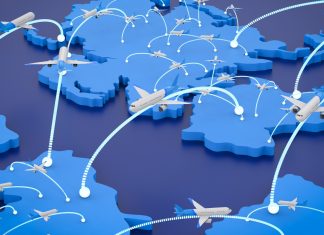The coronavirus pandemic served as a temporary kill shot to the business travel industry. A tech-savvy and adaptable hospitality industry is rising from these ashes in the remote work era.
On short notice, the coronavirus pandemic brought global travel to a standstill. In April 2020, US airline passengers decreased 96% compared with April 2019, according to the Bureau of Transportation Statistics data. At the same time, many organizations adopted remote work policies to mitigate the spread of COVID-19, and business conferences were transformed into virtual affairs with varying degrees of success. These components in tandem served as a temporary kill shot to the multi-billion dollar business travel industry.
With a glut of vacancies and a dearth of guests, the business travel industry is reinventing itself for the remote work era and a world forever transformed by COVID-19.
The all-but flatlined travel industry particularly impacted the Dunwoody metro area located 20-minutes north of Atlanta. In 2019, business travelers represented 61% of Dunwoody visitors. In April of 2020, the occupancy rate in the area was at 7%, according to Steven Schumacher, director of sales at Discover Dunwoody.
While Schumacher is confident business travel will return to its pre-pandemic levels, in a post-pandemic world he foresees the rise of the digital nomad and increased travel among people who choose to merge professional lives with vacation.
“I think we will see these two worlds come together, as more and more business travelers opt to bring their families on trips. The ‘bleisure’ travel trend will become more prevalent,” Schumacher said via email.
Many organizations have adopted remote work policies amid a modern plague. While some companies have brought telecommuters back to the traditional office, others have many long-term commitments to remote work.
Ernest Lee, managing director development and investments, Americas, with citizenM hotels, similarly alluded to remote work-enabled “nomadic behavior” among professionals. The company recently announced a global passport; a subscription service allowing remote workers with a penchant for frequent traveling the ability to stay in any of the citizenM’s 21 hotels around the globe.
“We certainly think that this new sort of lifestyle will attract a certain type of person that wants to also blend in their personal interests and passions [with] not having to be tied down so much to a fixed location,” Lee said.
The company also offers a corporate subscription providing organizations with access to hotel rooms and meeting room spaces at a fixed price. Lee explained that this package is designed for remote teams who are no longer sharing “the same co-located space.”
To enhance the traditional business travel experience, hotels are incorporating a wide range of technologies, in-app features, Internet of Things (IoT) capabilities, and more. Shoring up holes across a company’s technical infrastructure could open up new opportunities for guest engagement and service offerings.
“The biggest issue when traveling remains connectivity and access to local services, being able to upgrade your room’s Wi-Fi connection or easily find and access local services such as mailing or food delivery are big missing pieces,” said Tyler Browning, director of business development at software company MartianCraft, via email.
More than one year after the first US COVID-19 case, the coronavirus pandemic continues to stymie the US economy. Necessity breeds innovation, as the adage goes, and these market disruptions have also created opportunities for new hospitality models within the business travel industry.
“Business travelers were already tired of box-like hotel rooms and are looking for a fresh and modern approach. They will be less likely to want to spend time in hotel bars and lobbies and will look to their hotel room to provide them with all of the amenities they could ever need,” said Shane Berry, chief customer officer at Mint House, via email.
























